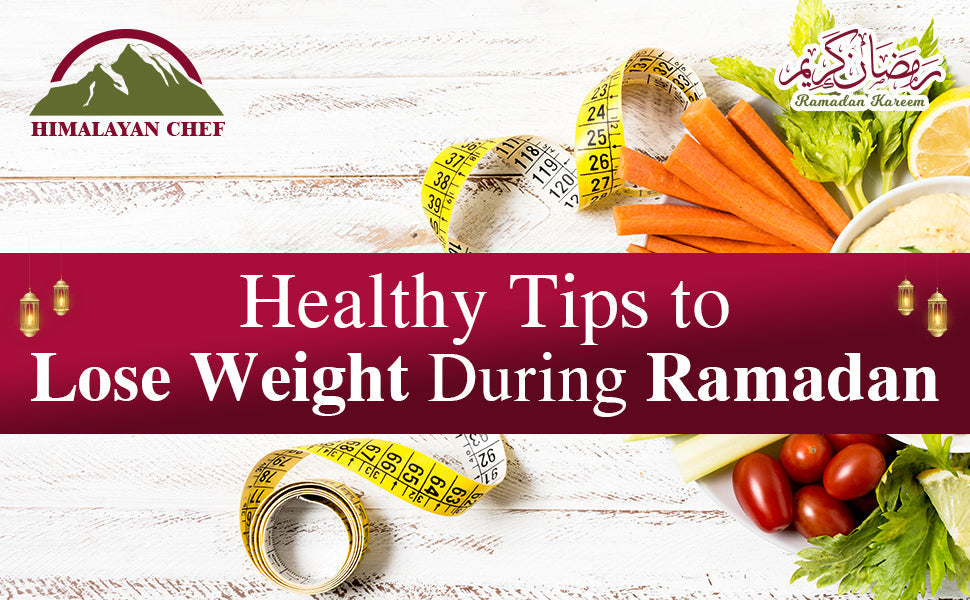How to Lose Weight During Ramadan?
Posted by HIMALAYAN CHEF

How to Lose Weight During Ramadan?
Ramadan can be an excellent opportunity to kickstart your weight loss journey. During this month, Muslims fast from sunrise to sunset, which encourages mindful and healthy eating habits. By focusing on nutritious foods, you can effectively lose weight while also replenishing essential vitamins and nutrients. This approach helps maintain a balance in your energy levels throughout the day, preventing any unwanted weight gain.
Intermediate Fasting vs Ramadan Fasting
When comparing Ramadan fasting and intermittent fasting, the primary distinction lies in spirituality. The benefits of both fasting methods are largely alike, but with intermittent fasting, individuals can drink water at intervals. In both fasting practices, it's essential to engage in safe and effective workout routines to prevent any negative impacts on your health. Now, let's discuss effective strategies for weight loss during Ramadan, but first, it's important to understand the optimal times for exercising without compromising your well-being.

Factors Facilitating Weight Loss During Ramadan
Several factors can contribute to weight loss during Ramadan, including:
Tips for Balanced Nutrition during Ramadan: Consuming a wholesome and nutritious diet during iftar and sahur is essential for providing the body with the necessary nutrients. It's important to include foods that are high in protein, complex carbohydrates, healthy fats, fiber, and essential vitamins and minerals.
Portion Control: Managing portion sizes during iftar and sahur helps to avoid excessive calorie consumption. Starting with smaller portions and eating at a slower pace can enhance feelings of fullness and lower the chances of overeating.
Drinking Water: Staying adequately hydrated throughout the day can promote a sense of fullness and boost metabolism. It also helps alleviate hunger that may arise from dehydration.
Healthy Sleep Pattern during Ramadan: Getting enough consistent sleep is crucial for supporting weight loss. Lack of sleep can lead to increased appetite and a slower metabolism. Therefore, it's essential to ensure you get adequate rest after sahur.

Best Physical Activity during Fasting
Engaging in regular physical activity during Ramadan can help burn body fat and maintain muscle mass. However, it's important to avoid excessive exercise and choose an appropriate time, as intense workouts while feeling hungry and thirsty can negatively impact your health.
-
Stress Avoidance:
Utilizing stress reduction techniques such as relaxation methods, meditation, and regular breathing exercises can be effective in managing stress. These factors can aid in weight loss during Ramadan. Since each person's body and needs are unique, it's important to create a weight loss plan tailored to individual health conditions and goals. If you encounter any health issues or concerns during your weight loss journey, consulting a healthcare professional is essential.

Best Time to Work Out During Ramadan
When planning your workouts during Ramadan, it's important to consider the timing in relation to your fasting schedule. Research indicates that exercising your lower body can lead to a decrease in blood pressure. Here’s when you can exercise during Ramadan:
- 90 minutes before sunset
- Between 3 am and 4 am
- After the evening meal
- Between 11 pm and 2 am

A Healthy Guide to Lose Weight During Ramadan
Choose a Balanced Suhoor Meal
Suhoor is the most crucial meal of the fasting day. A well-rounded Suhoor keeps you feeling full and energized for extended periods. Here’s what to include:
- Complex Carbohydrates: Opt for whole wheat bread, oats, brown rice, or quinoa to maintain your energy levels.
- Protein-Rich Foods: Incorporate eggs, yogurt, nuts, and legumes to help you stay satisfied longer.
- Fiber-Rich Fruits & Vegetables: Include apples, bananas, cucumbers, and leafy greens to support digestion and curb hunger pangs.
- Hydrating Fluids: Make sure to drink plenty of water and steer clear of sugary drinks or caffeinated beverages that can lead to dehydration.
Break Your Fast the Right Way at Iftar
How you break your fast can significantly affect your digestion and metabolism. Begin with:
-
Dates & Water:
These are natural energy boosters that help stabilize blood sugar levels.
- Soups & Salads: A gentle way to prepare your stomach for digestion.
- Grilled or Baked Meals: Steer clear of fried and oily foods, as they can contribute to weight gain.
- Portion Control: Moderation is essential for maintaining a calorie deficit if you're aiming for weight loss.

Manage Your Sugar & Salt Consumption
Excessive sugar and salt intake can contribute to weight gain and bloating.
To prevent this:
- Cut back on sweets and sugary beverages during Ramadan.
- Minimize salty snacks and processed foods to avoid water retention.
- Opt for natural sweeteners such as dates or honey instead of refined sugar.
FAQs
How to lose weight during Ramadan?
You can lose weight quickly during Ramadan by incorporating fiber-rich foods into your suhoor, engaging in at least 30 minutes of exercise, and avoiding foods that are high in sugar, salt, and fat.
Can Ramadan help you lose weight?
Absolutely, Ramadan can be an excellent opportunity to shed some pounds as it allows you to adjust your routine and adopt a healthier diet throughout the month.
Is it okay to work out while fasting?
It's generally not advisable to exercise while fasting. However, you can work out before your sehri or wait for 2-3 hours after Iftari to do so.
TAGS:
SHARE:


